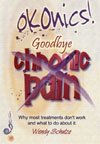 Chapter Six explains Energetic Debt.
Chapter Six explains Energetic Debt.The OKONICS system teaches you that your energy is affected by everything that you do. You can gather and start to invest your energy with a great lifestyle or you can spend it recklessly.
For 'great lifestyle' read 'Ms Schulz's lifestyle'.
Energetic debt is when your body requires more energy than you have available. Your body then has to use the energy available in your muscles, tissues and organs so they start to break down and you get ill or injured easily.
EoR is not quite sure what this 'energy' is since Ms Schulze fails to define it at any stage. Perhaps she means the metabolic pathway by which adenosine triphoshate is utilised to release energy, but it is more likely that she's simply using the word 'energy' as a vague, ill-defined catch-all phrase without any real meaning. Anyway, an indefinite, unexplained concept is so much more amenable to holistic interpretations.
You can increase your bodies [sic] "income" by improving your physical and emotional fitness. You can then decrease your spending by giving up emotionally draining relationships and toxic physical things like food additives and pollutants.
Are you seeing a pattern here? Ms Schulze has an unreasoning fear of 'toxic' things ie anything that isn't organic, natural, unsullied and pure.
Chapter Seven (The Four Stages of Learning) is much longer at nine pages, but only because it reiterates information that has been part of training models since at least the early 1970s. The argument is that people progress through four stages of learning: the unconscious-incompetent (where people don't recognise the lack of a skill), the conscious-incompetent (where people recognise the lack of a skill), the conscious-competent (where people have a skill but it is not yet automatic), and the unconscious-competent (where people have a skill and practise it automatically). Ms Schulze disingenuously presents it as part of her "OKONICS system" without credit (or at least acknowledgement, since the originator remains a matter of discussion). Ms Schulze does, however, enliven it with her own brand of "Wendy's 'new age nonsense'" (as she terms it).
Many highly educated western people are Unconscious-Incompetent about things that are simply natural in third world countries and this creates much of the depression, chronic illness, drug addiction and suicide that is so common in our culture.
As opposed to high child mortality, poverty, starvation, AIDS, prostitution, lack of medical treatment, disease, lack of clean water, parasites, and a severely reduced lifespan that are so common in the 'natural' third world countries.
Understanding that the world is a sea of conscious energy and that each of us are [sic] a part of this sea of knowledge is essential.
Which is it? A sea of consciousness, or of knowledge? Or possibly a sea of delusion?
Physics experiments now confirm what the ancient "seers" taught. We are connected to "all that is" because we are a part of the energy field of the "all that is". Many religions call "all that is" - "God".
Ms Schulze: physics has not confirmed anything about ancient "seers". Nor has it ever found an energy field that is "God". These statements are lies (oh, hang on, truth is whatever you want it to be - so these statements are a 'truth' that would be accepted by very few, and certainly not the physicists so lauded by Ms Schulze) and incoherent mumbo-jumbo mixing religious concepts and inappropriate physical terms.
For the Conscious-Incompetent, Ms Schulze advises
Always remember that emotions are a bit like the weather, sometimes sunny, sometimes rainy, and just keep going.
Apart from the bad grammar (does the weather keep going, or the emotions?) this is just more inanity. Ms Schulze, should she so choose, could get a well-paying job writing greeting card verses.
The closing point of this chapter is that
healing [with] the western world-view is often Unconscious Incompetent.
Presumably as opposed to natural nice third world holistic happy-thoughts pain and suffering.
Chapter Eight addresses Health Catalysts.
Yet again, Ms Schulze is not referring to any molecular action, not to any immune response, but to something rather different:
OKONICS expects you to be proactive in choosing the people around you and this includes your Healing Catalysts. [...] This chapter is about learning to choose a Health Catalyst who will treat you with the respect and understanding that you deserve. [...] Only you can heal you. Your Health Catalyst can either catalyse your body/mind to make the conditions to heal or not. This is for you to assess.
At least we're back on familiar ground: medical treatment bad, truth whatever you want it to be, and you can 'heal yourself'. EoR looks forward to the day the last hospital is shut because everybody is at home self healing.
University trained graduates are to be avoided, since they have only learned the "Yang or science of healing". You should instead find someone with a bedside manner ("the Yin balance") which is not part of university training. Qualities of a Health Catalyst include listening skills, empathy, communication skills, honesty, "they live in the real world" (which pretty much excludes all the alternative practitioners) and respect. All very admirable skills, but why do you need to sign up to a "system" to realise whether someone is a good health practitioner or not (though EoR would also add skills such as knowledge and experience).
In the OKONICS system you are learning how to value and honour your pain and your inner feelings so that you create vitality and health.
Is it just EoR, or do we seem to be slipping further and further from the promise on the cover of the book to say "Goodbye Chronic Pain"?
Okonics 2
Okonics 1
No comments:
Post a Comment
Note: only a member of this blog may post a comment.